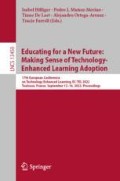Abstract
Although prior studies have shown the benefits of using learning analytics dashboards (LADs) in non-gamified contexts in higher education, few have focused on pre-college users and gamified learning environments. In this paper, we present the design of Gwynnette Dashboard, an interactive student-facing LAD for secondary school learners that aims at promoting mastery learning in a gamified intelligent tutoring system. It contains three main components: a planet chart with two control buttons, a connected skill progress bar with a skill mastery growth line, and an overall mastery progress bar. We also report two user-centered design changes after validating our design with 18 students iteratively. Our preliminary evaluation of a fully-developed version with 2 students revealed that this dashboard with linked representations of skill mastery status and skill growth was easy for learners to understand and motivated learners to use it to regulate learning. Our future work will focus on broader classroom studies to experimentally investigate the effectiveness of this dashboard to foster mastery learning and growth mindset.
Access this chapter
Tax calculation will be finalised at checkout
Purchases are for personal use only
References
Bodily, R., Verbert, K.: Review of research on student-facing learning analytics dashboards and educational recommender systems. IEEE Trans. Learn. Technol. 10(4), 405–418 (2017)
Corbett, A.T., Anderson, J.R.: Knowledge tracing: modeling the acquisition of procedural knowledge. User Model. User-Adap. Inter. 4(4), 253–278 (1994)
Hamari, J.: Do badges increase user activity? A field experiment on the effects of gamification. Comput. Hum. Behav. 71, 469–478 (2017)
Hartwig, K., Reuter, C.: Nudging users towards better security decisions in password creation using whitebox-based multidimensional visualisations. Behav. Inf. Technol. 41(7), 1357–1380 (2022)
Hou, X., Nguyen, H.A., Richey, J.E., McLaren, B.M.: Exploring how gender and enjoyment impact learning in a digital learning game. In: Bittencourt, I.I., Cukurova, M., Muldner, K., Luckin, R., Millán, E. (eds.) AIED 2020. LNCS (LNAI), vol. 12163, pp. 255–268. Springer, Cham (2020). https://doi.org/10.1007/978-3-030-52237-7_21
Lane, H.C.: Intelligent tutoring systems: prospects for guided practice and efficient learning (2006)
Long, Y., Aleven, V.: Mastery-oriented shared student/system control over problem selection in a linear equation tutor. In: Micarelli, A., Stamper, J., Panourgia, K. (eds.) ITS 2016. LNCS, vol. 9684, pp. 90–100. Springer, Cham (2016). https://doi.org/10.1007/978-3-319-39583-8_9
Long, Y., Holstein, K., Aleven, V.: What exactly do students learn when they practice equation solving? Refining knowledge components with the additive factors model. In: Proceedings of the 8th International Conference on Learning Analytics and Knowledge, pp. 399–408 (2018)
Meece, J.L., Anderman, E.M., Anderman, L.H.: Classroom goal structure, student motivation, and academic achievement. Annu. Rev. Psychol. 57, 487–503 (2006)
Muldner, K., Wixon, M., Rai, D., Burleson, W., Woolf, B., Arroyo, I.: Exploring the impact of a learning dashboard on student affect. In: Conati, C., Heffernan, N., Mitrovic, A., Verdejo, M.F. (eds.) AIED 2015. LNCS (LNAI), vol. 9112, pp. 307–317. Springer, Cham (2015). https://doi.org/10.1007/978-3-319-19773-9_31
Nagashima, T., et al.: Designing playful intelligent tutoring software to support engaging and effective algebra learning. In: Hilliger, I., et al. (eds.) EC-TEL 2022, LNCS 13450, pp. xx–yy. Springer, Cham (2022)
Verbert, K., Duval, E., Klerkx, J., Govaerts, S., Santos, J.L.: Learning analytics dashboard applications. Am. Behav. Sci. 57(10), 1500–1509 (2013)
Verbert, K., et al.: Learning dashboards: an overview and future research opportunities. Pers. Ubiquit. Comput. 18(6), 1499–1514 (2014)
Author information
Authors and Affiliations
Corresponding author
Editor information
Editors and Affiliations
Rights and permissions
Copyright information
© 2022 The Author(s), under exclusive license to Springer Nature Switzerland AG
About this paper
Cite this paper
Hou, X., Nagashima, T., Aleven, V. (2022). Design a Dashboard for Secondary School Learners to Support Mastery Learning in a Gamified Learning Environment. In: Hilliger, I., Muñoz-Merino, P.J., De Laet, T., Ortega-Arranz, A., Farrell, T. (eds) Educating for a New Future: Making Sense of Technology-Enhanced Learning Adoption. EC-TEL 2022. Lecture Notes in Computer Science, vol 13450. Springer, Cham. https://doi.org/10.1007/978-3-031-16290-9_48
Download citation
DOI: https://doi.org/10.1007/978-3-031-16290-9_48
Published:
Publisher Name: Springer, Cham
Print ISBN: 978-3-031-16289-3
Online ISBN: 978-3-031-16290-9
eBook Packages: Computer ScienceComputer Science (R0)

